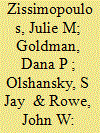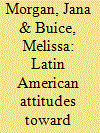|
|
|
Sort Order |
|
|
|
Items / Page
|
|
|
|
|
|
|
| Srl | Item |
| 1 |
ID:
137810


|
|
|
|
|
| Summary/Abstract |
Increasing life expectancy offers the potential benefit of additional years of productivity and engagement to both individuals and society as a whole. However, it also carries substantial risks. For many, advanced age brings increased disease and disability (including cognitive impairment), financial insecurity, and social isolation. These risks are greatest for those with the least education and financial resources. An aging society must cope with increasing demands for high-quality geriatric care, mounting stresses on social insurance programs (such as Social Security and Medicare in the United States), and the increasing danger that the growing gap between the haves and have-nots will threaten societal cohesion. These risks can be mitigated or aggravated by the lifestyle and savings behavior of individuals, families, employers, and the government. We present policy options in the areas of education, work and retirement, financial security, health care, and social cohesion that can promote the benefits and reduce the risks of longer life.
|
|
|
|
|
|
|
|
|
|
|
|
|
|
|
|
| 2 |
ID:
127824


|
|
|
|
|
| Publication |
2013.
|
| Summary/Abstract |
This article outlines three theoretical arguments-socialization, status discontent, and elite cues-that generate competing predictions about the way context shapes gender attitudes. Using hierarchical analysis, we assess the power of these arguments in Latin America, a region that manifests considerable variation on our central explanatory variables and thus offers important theoretical leverage. We find men's gender attitudes to be highly contingent on elite cues and susceptible to backlash effects in response to women's economic advancement. Also, where women lack national representation, distrust of government promotes support for female leadership as an alternative to the discredited (male) establishment. The analysis supports existing individual-level explanations of gender attitudes and demonstrates a connection between diffuse democratic values and gender egalitarianism. The findings suggest that recent advances for female politicians in Latin America may be susceptible to reversal, and they illuminate strategies for strengthening women's equality in the region.
|
|
|
|
|
|
|
|
|
|
|
|
|
|
|
|
|
|
|
|
|